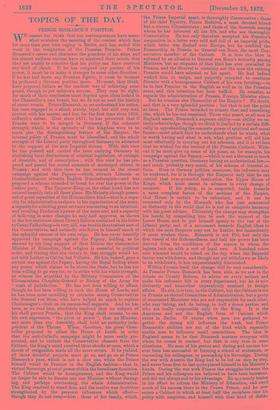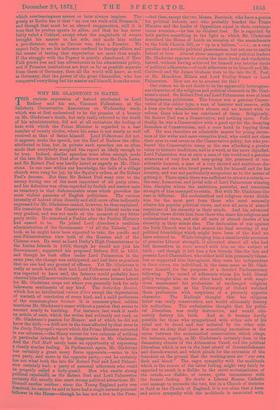TOPICS OF THE DAY.
PRINCE BISMARCK'S POSITION.
WE cannot but think that our contemporaries have some- what mistaken the meaning of the contest which has for some time past been raging in Berlin, and has ended this week in the resignation of the Prussian Premier. Prince Bismarck's career and character, the grandeur of his aims, and his almost uniform success, have so mastered their minds, that they are unable to conceive that his policy can have received any kind of check. If he has resigned any portion of his power, it must be to make it stronger in some other direction ; if he has laid down any Prussian dignity, it must be because he preferred a German position more. He must, they think, have prepared failure as the readiest way of achieving some grand, though as yet unknown success. They may be right, for much of their conclusion must depend upon ideas locked in the Chancellor's own breast, but we do not so read the history of recent events. Prince Bismarck, as we understand his action, has been engaged in a silent, stately, loyal, but still very real, contest with his master, and has, for the first time since 1866, suffered a defeat. Ever since 1871, he has perceived that if Prussia were to be merged in Germany, if the coherent strength which is the specialty of the kingdom were to be made also the distinguishing feature of the Empire, the internal policy of Prussia must be liberalised, and the whole strength of the Liberal party throughout Germany be attracted to the support of the new Imperial throne. With this view he has pressed and carried the laws unifying Germany by abolishing local distinctions of criminal legislation, of coinage, of domicile, and of conscription ; with this view he has pre- pared and passed the recent measures of municipal reform in Prussia ; and with this view he has entered on the recent campaign against the Papacy—which attracts Liberals as Disestablishment attracts English Nonconformists—and has proposed a scheme intended to break for ever the power of the Junker party. The Emperor-King, on the other hand, has not entered heartily into all these plans. His Majesty, though posses- sed of great capacities of the Hohenzollern kind—that is, a capa- city for administration as shown in his organisation of the army, a capacity for selecting great servants amounting to an intuition; and recalling Frederick's power of the same sort, and a capacity of believing in some changes he only half approves, as shown in the few sentences about County Reform contained in his letter to CountFalkenberg—is very old, was bredin the straitest sect of the Conservatives, and naturally attributes to himself much of the splendid success of his own reign. He has never heartily approved the campaign against the Papacy, holding, as he showed by his long support of Herr Mahler the obscurantist Minister of Education, that religion is essential to political order, and fearing that the victory in that struggle would be, not with Luther or Calvin, but Voltaire. He has, indeed, gone a certain way against the Papacy, having the Royal feeling about any power which claims to be above the State, but he has not been willing to go very far, or to strike with his whole strength, as witness the acquittal by the Military Commission of the Ultramontane Chaplain-General or Bishop of the Army for " want of jurisdiction." He has not been willing to efface, though he has been willing to curb the House of Lords, and he has been most unwilling to ostracise strong Conservatives like General von Roon, who have helped so much to replace Charlemagne's chair on its cannon-ball supports. And he has been, as we read him, absolutely resolved that no subject of his shall govern Prussia ; that the King shall remain, to use his own expression, "the pivot of power "; that no Minister, any more than any Assembly, shall hold an authority inde- pendent of the Throne. When, therefore, his great Chan- cellor proposed to efface the House of Lords, in order- that the anti-Catholic campaign might be more easily pro- secuted, and to exclude the Conservative element from the Cabinet, the King's mind received three shocks at once, which a threat of resignation made all the more severe. If he yielded, all three doubtful projects must go on, and go on at Prince Bismarck's pace, which is not a slow one, while the Prince himself would be Premier in the English fashion—that is, virtual Sovereign, pivot of power within the hereditary dominion. The Cabinet would be homogeneous, and the King would no longer be able to dismiss any one Minister without derang- ing, and perhaps overturning, the whole Administration. The King resolved to stand firm, and the resolve was doubtless strengthened by the personal influences which affect— though they do not sway—him ; those of his family, which, the Prince Imperial apart, is thoroughly Conservative ; those of his chief Equerry, Prince Badzivil, a most devoted friend' but a sincere Ultramontane ; and those of the Generals among whom he has laboured all his life, and who are thoroughly Conservative. He not only therefore accepted his Premier's resignation in a letter very cold and full of an imperial pride,_ which letter was flashed over Europe, but he confided the Premiership in Prussia to General von Boon, the most Con- servative member of the Cabinet. It is true the blow is.
softened by an allusion to General von Roon's seniority among Ministers, bat no etiquette of that kind has ever prevailed in Prussia, and the General is certainly not the man the retiring Premier would have selected as his agent. He had indeed wished him to resign, and palpably intended to continue Premier with a homogeneous Cabinet of his own forming,—to- be in fact Premier in the English as well as in the Prussian. sense, and this intention has been baffled. He remains, as regards the administration of Prussia, Foreign Minister alone.. But he remains also Chancellor of the Empire ? No doubt, and that is a very splendid position ; but that is not the point at issue. The Prince intended to remain that and something else, which he has not remained. Those who assert, as all men in England assert, Bismarck's supreme ability—an ability we en- tirely acknowledge, though we think it limited by a certain diffi- culty in apprehending the concrete power of spiritual and moral forces—must admit that he understands what he wants, what is worth having and what is not, what position will aid him most effectually in carrying out his schemes, and it is eviienf5 that he wished for the control of the Prussian Cabinet. With- out it he must give up some of his plans, as, for example, his campaign against the Papacy,—which is not a German so much as a Prussian question, Germany having no ecclesiastical law,— and much, probably very much, of his scheme of internal re- form. Even in German politics, moreover, his influence may be weakened, for it is through the Emperor only that he can control that over-powerful institution, the Upper House of Kings, which must assent in advance to every change of moment. If his policy, as is suspected, tends towards a more complete fusion of the sections of the Enipire, that House is certain to be refractory, and it can be- overawed only by the Monarch who has just announced so distinctly to the world that he is not in complete harmony with his great adviser. Ultimately the change may strengthen• his hands, by compelling him to seek the support of the Lower House, and to put himself openly in the van of the- Liberal party, and of a movement towards English ideas to- which the next Emperor may not be hostile, but immediately it must weaken them. Bismarck is not Pitt, but only the first vassal of the Hohenzollerns, and half his power has been derived from the confidence of the master to whom the- legions look up with a sort of loyal awe. A hundred voices now silenced would be raised on the day when the >Imperial favour was withdrawn, and though not yet withdrawn or likely to be withdrawn, it has unquestionably diminished.
Within Prussia itself the change will be very considerable. As Premier Prince Bismarck has been able, as we saw in the debate on County Reform, to advise on every subject and make his influence felt in every department, but he is now distinctly and somewhat imperatively confined to foreign affairs. He sits, it is true, in the Cabinet, but the Cabinet is not in Prussia an elected Committee of Administration, but a group. of nominated Ministers who are not responsible for each other, who may belong, and do belong, to half a dozen parties, and who are really responsible only to the King. It is the American and not - the English form of Cabinet whidh exists in Berlin. Of course when men 'are gathered to- gether the strong will influence the weak, but Prince Bismarck's abilities are not of the kind which especially enable men to influence small committees. The idea in England seems to be that Bismarck masters everyone with whom he comes in contact, but that is only true in some situations. No man of his genius and daring and success has ever been less successful in forming a school of statesmen, or converting his colleagues, or persuading his Sovereign. Daring the war with Austria the King had to be led on step by step, and never from first to last quite placed himself in his Minister's hands. During the war with France the struggles between the Prince and his colleagues are believed to have been incessant, and did not always end to his advantage. He v.*s nearly beaten in his effort to reform the Ministry of Education, and owed much of his success there to the Crown Prince, and he now enters a Cabinet in which at least half the members view his policy with suspicion, and himself with that kind of dislike which overbearingness sooner or later always inspires. The gossip at Berlin has it that " no one can work with Bismarck," and though that must be an absurd exaggeration, still it is true that he prefers agents to allies, and that he has never fairly ruled a Cabinet, except when the magnitude of events brought his master to his side, and made him rather a pro-dictator, such as Cavour was, than a Premier. We expect fully to see his influence confined to foreign affairs, and the means of testing that expectation are more than ample. If the struggle with the Papacy is quietly abandoned, if Herr Falk grows less and less adventurous in his educational policy, and if Prussian institutions are kept as far as possible separate from those of Germany, then all the world will know, as well as Germany, that the power of the great Chancellor, who has conquered everything but his master and himself, is on the wane.



































 Previous page
Previous page